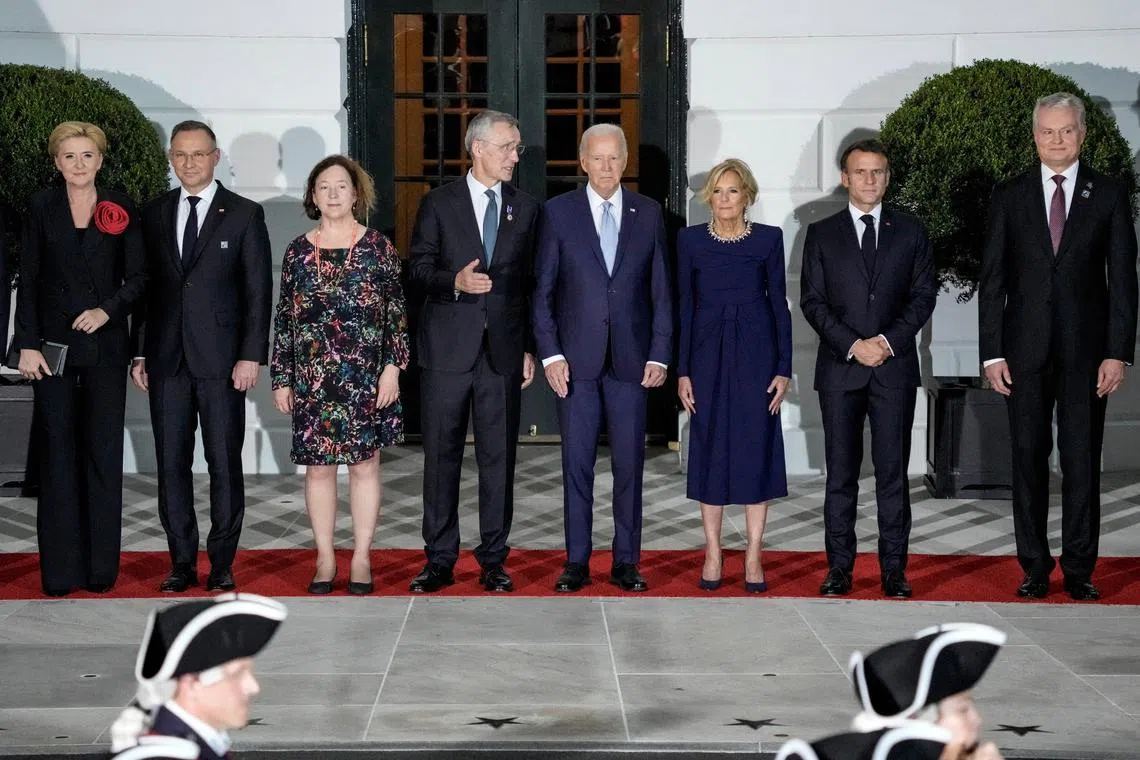China warns Nato against ‘provoking confrontation’ over Russia ties
Sign up now: Get ST's newsletters delivered to your inbox

US President Joe Biden (fifth from left) and US First Lady Jill Biden posing for a picture with Nato allies and partners in the US on July 10.
PHOTO: REUTERS
BEIJING – China on July 11 warned Nato against “provoking confrontation” over its ties with Russia, after the alliance accused Beijing of playing a key role in helping Moscow’s assault on Ukraine.
Nato leaders said in a declaration at their summit
It said Beijing’s “so-called ‘no limits’ partnership” and “large-scale support for Russia’s defence industrial base” were of “profound concern”.
In response, a spokesperson for Beijing’s mission to the European Union said: “Nato should stop hyping up the so-called China threat, and provoking confrontation and rivalry, and do more to contribute to world peace and stability.”
The spokesperson added: “It is known to all that China is not the creator of the Ukraine crisis. China’s position on Ukraine is open and above board.”
China has refused to condemn Russia’s invasion, and in 2023 released a paper calling for a “political settlement” to the conflict, which Western countries said could enable Russia to retain much of the territory it has seized in Ukraine.
China and Russia’s strategic partnership has grown closer since the invasion.
Beijing presents itself as a neutral party in the war and says it is not sending lethal assistance to either side, unlike the United States and other Western nations.
It has, however, offered a critical lifeline to Russia’s isolated economy, with trade booming since the conflict began.
But that economic partnership has come under close scrutiny from the West in recent months, with Washington vowing to go after financial institutions that facilitate Moscow’s war effort.
The US and Europe have also accused Beijing of selling components and equipment necessary to keep Moscow’s military production afloat.
US Secretary of State Antony Blinken said in April this included “machine tools, semiconductors, other dual-use items that have helped Russia rebuild the defence industrial base that sanctions and export controls had done so much to degrade”.
Beijing has denied claims it is aiding Russia’s fighting in Ukraine and insisted it will not accept criticism or pressure over its ties with Moscow.
On July 11, its Foreign Ministry accused the alliance of “prejudice, smearing and provocation”. “Nato’s rhetoric about China’s responsibility in Ukraine is unjustified and malicious,” spokesman Lin Jian said.
“We urge Nato to reflect on the root causes of the crisis and its own actions, listen carefully to the just voice of the international community, and take concrete actions to ease the situation, instead of shifting the blame to others.”
China is staging joint “anti-terrorist” exercises with Russian ally Belarus this week, for the first time since Russia’s invasion of Ukraine in February 2022. The exercises began on July 8 in Brest, a city right on the border with Poland, according to a statement issued on July 10 by the Chinese Defence Ministry.
The statement said the manoeuvres will last until mid-July, but did not give the exact number of Chinese soldiers involved.
Both sides are working to improve combat techniques, and deepen cooperation and communication between the two armies, the statement added.
Chinese diplomatic officials insisted that the exercises were not aimed at any country in particular. But Poland’s Defence Ministry slammed the timing of the exercises.
It warned of “the risk of the operations in question being used for disinformation and propaganda purposes... to coincide with the Nato summit”.
However small in scale, the exercises still involve China deploying troops on Nato’s doorstep, and to a country Russia used as a launch pad for its invasion of Ukraine.
Analysts believe that the date and location of the exercises were not chosen by chance, arguing that China wanted to send Nato a message. “Multilateral exercises are often used to send political signals,” Dr Kelly Grieco of the Stimson Centre foreign policy and defence think-tank told AFP.
Indeed, she argued that when it comes to military drills, it’s much more about political signals – more than for the exercise itself.
She points out that China had already carried out anti-terrorism exercises in Belarus four times between 2011 and 2018, but had not done so since. The fact that they are taking place that close to the border is part of the signalling too, she added.
Countries often organise their joint exercises to coincide with developments abroad – not least of them China, added Dr Alice Ekman, senior analyst for Asia at the European Union Institute for Security Studies.
“In April 2023, the Chinese held exercises with Russia in the East China Sea, close to Japanese islands, on the eve of a trilateral US-Japan-South Korea summit to signal their opposition to such a summit being held,” Dr Ekman told AFP.
As well as moving closer to Russia, China is becoming increasingly hostile to Nato.
It accuses Nato of working to contain China at Washington’s instigation, with Beijing worried about the alliance’s expanding role in the Asia-Pacific region.
Nato is perceived by China as “clearly hostile for historical reasons”, Dr Ekman said.
But those reasons were becoming “increasingly strategic as the threat from China becomes an integral part of the organisation’s strategic thinking”, she added. AFP


